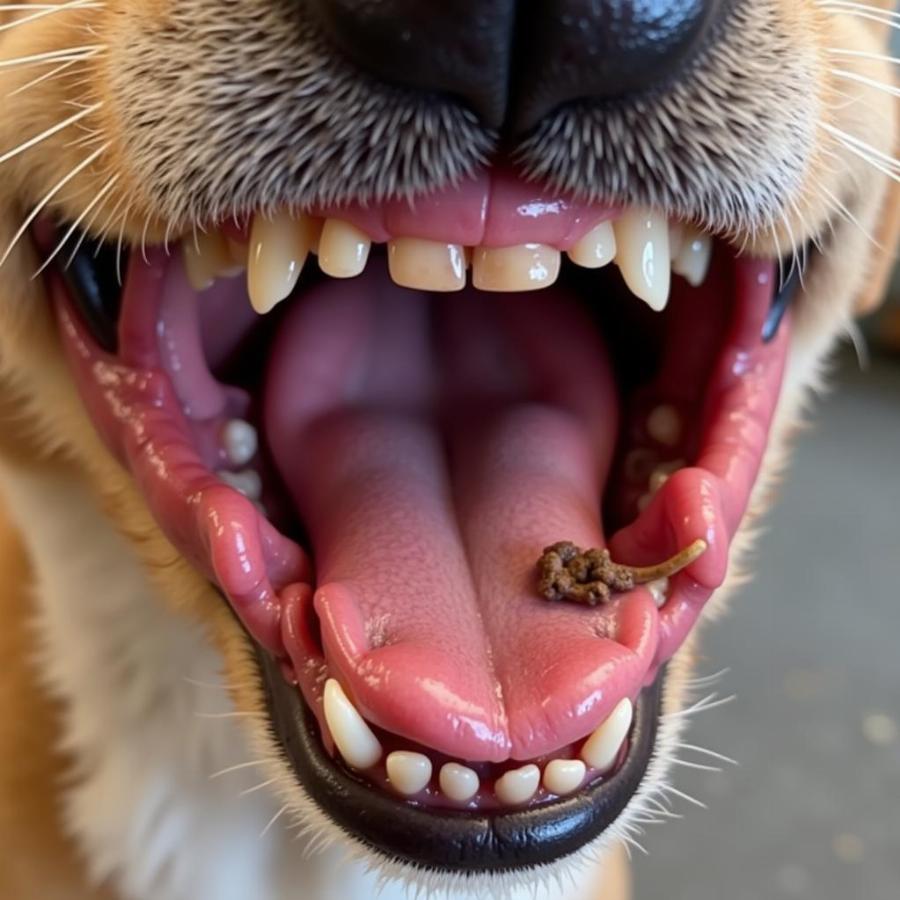Brown stains on your dog’s teeth can be alarming, but understanding the reasons behind them can help you address the issue effectively. While pearly white teeth are aesthetically pleasing, brown discoloration can signal underlying dental problems that require attention. This article will delve into the common causes of brown dog teeth, explore potential health concerns, and provide practical cleaning tips to maintain your furry friend’s oral hygiene.
Dental health is crucial for a dog’s overall well-being. Brown teeth in dogs can stem from various factors, including tartar buildup, plaque, genetics, certain medications, and even dietary habits. Ignoring brown stains can lead to more severe issues like gum disease, tooth decay, and even systemic infections. Let’s explore these aspects in detail to ensure your dog’s teeth and gums stay healthy.
Understanding Why Dogs Get Brown Teeth
Several factors contribute to the browning of a dog’s teeth. Identifying the root cause is crucial for effective treatment and prevention.
Tartar Buildup and Plaque: The Usual Suspects
Plaque, a sticky film containing bacteria, constantly forms on your dog’s teeth. If not removed regularly, it hardens into tartar, a brown or yellowish deposit. Tartar buildup is a primary cause of brown discoloration and can lead to gum inflammation and periodontal disease.
Genetics: Some Breeds are More Prone
Just like humans, some dog breeds are genetically predisposed to dental issues, including brown teeth. Smaller breeds and those with crowded teeth are particularly susceptible to tartar buildup.
Medications: An Unforeseen Side Effect
Certain medications can cause tooth discoloration as a side effect. If you notice browning after starting a new medication, consult your veterinarian. They can determine if the medication is the culprit and suggest alternatives if necessary.
Diet: The Impact of What Your Dog Eats
A diet high in sugary treats and processed foods can contribute to plaque and tartar formation, leading to brown teeth. Providing a balanced diet and limiting sugary snacks is essential for maintaining good oral hygiene.
Potential Health Concerns Related to Brown Dog Teeth
Brown teeth are not just a cosmetic issue; they can indicate underlying health problems.
Gum Disease: A Serious Threat
Tartar buildup irritates the gums, leading to gingivitis, characterized by redness, swelling, and bleeding. If left untreated, gingivitis can progress to periodontal disease, a severe infection that can damage the supporting structures of the teeth and even lead to tooth loss.
Tooth Decay: Painful and Destructive
Bacteria in plaque produce acids that attack tooth enamel, causing cavities and tooth decay. This can result in pain, difficulty eating, and potential tooth loss.
Systemic Infections: Beyond the Mouth
In severe cases, bacteria from dental infections can enter the bloodstream and spread to other organs, causing systemic infections that can affect the heart, kidneys, and liver.
 Dog with Gingivitis
Dog with Gingivitis
Cleaning Your Dog’s Teeth: A Step-by-Step Guide
Regular cleaning is crucial to prevent brown teeth and maintain good oral hygiene.
Brushing: The Gold Standard
Brushing your dog’s teeth daily with a dog-specific toothpaste is the most effective way to remove plaque and prevent tartar buildup. natural balance treats for dogs can also help with oral hygiene.
Dental Chews and Treats: A Helpful Supplement
Dental chews and treats can help scrape away plaque and tartar. Look for products approved by the Veterinary Oral Health Council (VOHC).
Professional Cleaning: When Necessary
Your veterinarian may recommend professional dental cleaning under anesthesia to remove heavy tartar buildup and address any existing dental problems. This is especially important if your dog has hard plaque on dog’s teeth.
(https://beautdogs.com/chlorhexidine-mouthwash-for-dogs.html).]
Conclusion
Brown teeth in dogs can be a sign of underlying dental issues that require attention. By understanding the causes, potential health concerns, and implementing proper cleaning techniques, you can ensure your furry friend maintains healthy teeth and gums. Regular brushing, appropriate dental chews, and professional cleanings when necessary are crucial for preventing brown discoloration and promoting overall oral health. Don’t hesitate to consult your veterinarian if you have any concerns about your dog’s teeth.
FAQ
-
Is it normal for dogs’ teeth to be brown? While some discoloration is normal with age, significant browning often indicates tartar buildup and requires attention.
-
How can I prevent my dog’s teeth from turning brown? Regular brushing, dental chews, and a healthy diet are key to preventing brown discoloration.
-
Can I use human toothpaste on my dog? No, human toothpaste contains ingredients that are toxic to dogs. Always use dog-specific toothpaste.
-
How often should I take my dog for professional dental cleaning? Your veterinarian can determine the appropriate frequency based on your dog’s breed, age, and dental health.
-
Are there any home remedies for brown dog teeth? While some home remedies exist, it’s best to consult your veterinarian before trying them.
-
What are the signs of gum disease in dogs? Red, swollen gums, bad breath, difficulty chewing, and excessive drooling can be signs of gum disease.
-
Can brown teeth cause pain for my dog? Yes, brown teeth often indicate underlying dental problems that can be painful.
Further Reading
You might also be interested in reading about dog toys for little dogs and can dogs eat raw chicken gizzards.
Beaut Dogs: Your Trusted Source for Dog Care
Beaut Dogs is your go-to resource for all things dog-related, providing reliable and insightful information on the fascinating world of canines. From breed-specific characteristics and care guides to health advice and product recommendations, we’re here to support you in providing the best care for your beloved companion. For any assistance or specific inquiries, feel free to reach out to us via Email at [email protected] for detailed and accurate answers. We are passionate about empowering dog owners with knowledge and resources to ensure their furry friends live long, healthy, and happy lives. Visit https://beautdogs.com today to learn more!